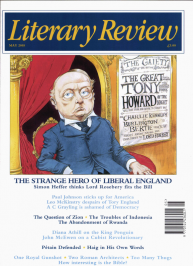Tristan Quinn
Writing on the Fall
They Were Counted
By Miklós Bánffy (Translated by Patrick Thursfield and Katalin Bánffy-Jelen)
Arcadia 596pp £14.99
Originally published in 1934, this vast, grand novel – the first in a trilogy – portrays the blind folly of the Hungarian aristocracy carousing their way towards destruction in the decade before the First World War. Its title is derived – as are those of the later two books – from the Old Testament story of Belshazzar, the Babylonian king killed after a great feast at which he and his followers blithely worshipped the gods of gold and silver. Belshazzar, of course, was terrified by the writing that appeared on the wall: ‘The Lord hath counted thy kingdom… Thou art weighed in the balance and art found wanting… Thy kingdom is divided.’ Here it is the menace of modernity and the outside world, rather than God, that puts the good times at risk.
They Were Counted begins with a panoramic scene of a world in motion, in which we get a first glimpse of many of the novel’s characters. Count Balint Abady is being driven slowly on a lonely road in a hired fiacre to a ball at the Transylvanian ‘country place’ of

Sign Up to our newsletter
Receive free articles, highlights from the archive, news, details of prizes, and much more.@Lit_Review
Follow Literary Review on Twitter
Twitter Feed
Alfred, Lord Tennyson is practically a byword for old-fashioned Victorian grandeur, rarely pictured without a cravat and a serious beard.
Seamus Perry tries to picture him as a younger man.
Seamus Perry - Before the Beard
Seamus Perry: Before the Beard - The Boundless Deep: Young Tennyson, Science, and the Crisis of Belief by Richard Holmes
literaryreview.co.uk
Novelist Muriel Spark had a tongue that could produce both sugar and poison. It’s no surprise, then, that her letters make for a brilliant read.
@claire_harman considers some of the most entertaining.
Claire Harman - Fighting Words
Claire Harman: Fighting Words - The Letters of Muriel Spark, Volume 1: 1944-1963 by Dan Gunn
literaryreview.co.uk
Of all the articles I’ve published in recent years, this is *by far* my favourite.
✍️ On childhood, memory, and the sea - for @Lit_Review :
https://literaryreview.co.uk/flotsam-and-jetsam